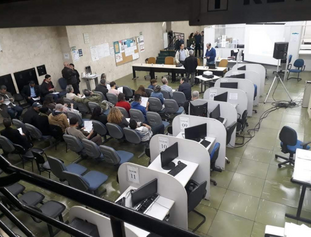The piece of text below is a shortened, hashed representation of this content. It is useful to ensure the content has not been tampered with, as a single modification would result in a totally different value.
Value:
721c58419b5946f83554f194f7a76a2001ae70d85f34861d50db351f316cbc5f
Source:
{"body":{"en":"<div class=\"editor-content-image\" data-image=\"\"><img src=\"https://decidim-oidp.s3.amazonaws.com/uploads/decidim/decidim_awesome/editor_image/image/580/Sao_Paulo_1.png\" alt=\"\"></div><p>Created by the 1st Open Government Action Plan, in 2017, the Open Dialogue is a regionalized accountability strategy, aiming to establish direct communication between the Subprefectures and the citizens, from meetings open to the public and held in each of the municipalities. 32 Sub-prefectures, with the participation of civil servants, Municipal Participatory Councils and Civil Society.</p><p>In these meetings, the reports developed by the Sub-prefectures on the actions and works in their territory are presented.</p><p>In 2022, face-to-face meetings were replaced by 32 online debates, to answer citizens' questions about the actions taken in 2021, in addition to consulting their opinions to improve the project model. Between February 22nd and April 10th, 2022, citizens were able to register their questions and suggestions about the Open Dialogue Report, through Participate+, having their questions answered on 05/16/2022.</p><p>More information:</p><p><a href=\"https://www.prefeitura.sp.gov.br/cidade/secretarias/governo/relacoes_institucionais/governo_aberto_na_cidade_de_sao_paulo/index.php?p=253007\" target=\"_blank\">https://www.prefeitura.sp.gov.br/cidade/secretarias/governo/relacoes_institucionais/governo_aberto_na_cidade_de_sao_paulo/index.php?p=253007</a></p><div class=\"editor-content-image\" data-image=\"\"><img src=\"https://decidim-oidp.s3.amazonaws.com/uploads/decidim/decidim_awesome/editor_image/image/581/Sao_Paulo_2.png\" alt=\"\"></div>","es":"<div class=\"editor-content-image\" data-image=\"\"><img src=\"https://decidim-oidp.s3.amazonaws.com/uploads/decidim/decidim_awesome/editor_image/image/582/Sao_Paulo_1.png\" alt=\"\"></div><p>Creado por el 1er Plan de Acción de Gobierno Abierto, en 2017, el Diálogo Abierto es una estrategia de rendición de cuentas regionalizada, que tiene como objetivo establecer una comunicación directa entre las Subprefecturas y la ciudadanía, a partir de reuniones abiertas al público y realizadas en cada uno de los municipios. prefecturas, con la participación de funcionarios, Consejos Participativos Municipales y Sociedad Civil.</p><p>En estas reuniones se presentan los informes desarrollados por las Subprefecturas sobre las acciones y obras en su territorio.</p><p>En 2022 se sustituyeron las reuniones presenciales por 32 debates online, para responder a las preguntas de la ciudadanía sobre las actuaciones realizadas en 2021, además de consultar sus opiniones para mejorar el modelo de proyectos. Entre el 22 de febrero y el 10 de abril de 2022, los ciudadanos pudieron registrar sus dudas y sugerencias sobre el Informe Diálogo Abierto, a través de Participa+, siendo respondidas sus dudas el 16/05/2022.</p><p>Más información:</p><p><a href=\"https://www.prefeitura.sp.gov.br/cidade/secretarias/governo/relacoes_institucionais/governo_aberto_na_cidade_de_sao_paulo/index.php?p=253007\" target=\"_blank\">https://www.prefeitura.sp.gov.br/cidade/secretarias/governo/relacoes_institucionais/governo_aberto_na_cidade_de_sao_paulo/index.php?p=253007</a></p><div class=\"editor-content-image\" data-image=\"\"><img src=\"https://decidim-oidp.s3.amazonaws.com/uploads/decidim/decidim_awesome/editor_image/image/583/Sao_Paulo_2.png\" alt=\"\"></div>","fr":"<div class=\"editor-content-image\" data-image=\"\"><img src=\"https://decidim-oidp.s3.amazonaws.com/uploads/decidim/decidim_awesome/editor_image/image/584/Sao_Paulo_1.png\" alt=\"\"></div><p>Créé par le 1er Plan d'action pour un gouvernement ouvert, en 2017, le Dialogue ouvert est une stratégie de responsabilisation régionalisée, visant à établir une communication directe entre les sous-préfectures et les citoyens, à partir de réunions ouvertes au public et tenues dans chacune des communes. préfectures, avec la participation des fonctionnaires, des conseils municipaux participatifs et de la société civile.</p><p>Dans ces réunions, les rapports élaborés par les sous-préfectures sur les actions et travaux sur leur territoire sont présentés.</p><p>En 2022, les réunions en présentiel ont été remplacées par 32 débats en ligne, pour répondre aux questions des citoyens sur les actions menées en 2021, en plus de consulter leurs avis pour améliorer le modèle de projet. Entre le 22 février et le 10 avril 2022, les citoyens ont pu enregistrer leurs questions et suggestions sur le rapport de dialogue ouvert, via Participate+, et leurs questions ont reçu une réponse le 16/05/2022.</p><p>Plus d'information:</p><p><a href=\"https://www.prefeitura.sp.gov.br/cidade/secretarias/governo/relacoes_institucionais/governo_aberto_na_cidade_de_sao_paulo/index.php?p=253007\" target=\"_blank\">https://www.prefeitura.sp.gov.br/cidade/secretarias/governo/relacoes_institucionais/governo_aberto_na_cidade_de_sao_paulo/index.php?p=253007</a></p><div class=\"editor-content-image\" data-image=\"\"><img src=\"https://decidim-oidp.s3.amazonaws.com/uploads/decidim/decidim_awesome/editor_image/image/585/Sao_Paulo_2.png\" alt=\"\"></div>"},"title":{"en":"São Paulo: Diálogo Aberto - Open dialogue","es":"São Paulo: Diálogo Aberto","fr":"São Paulo: Diálogo Aberto - dialogue ouvert"}}
This fingerprint is calculated using a SHA256 hashing algorithm. In order to replicate it yourself, you can use an MD5 calculator online and copy-paste the source data.








Share
Or copy link